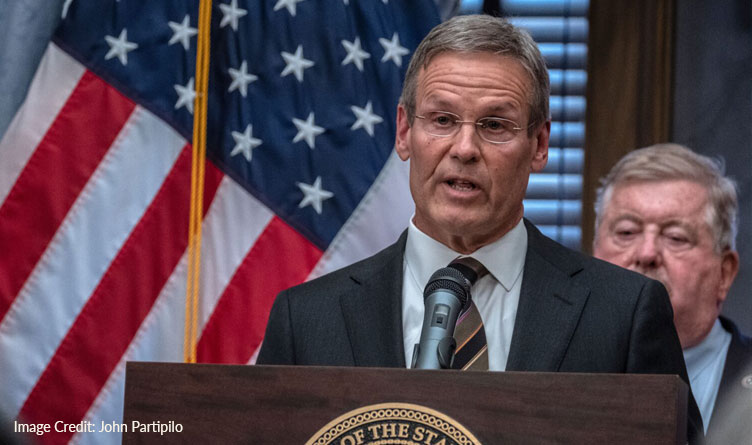Sponsor White says bill doesn’t relate to Lee’s Hillsdale College plans.
Photo Credit: John Partipilo
By Sam Stockard [Tennessee Lookout -CC BY-NC-ND 4.0] –
Amid uproar over Gov. Bill Lee’s plan to bring 50 conservative charter schools to Tennessee, legislation is being considered that would make it easier for charters to run in taxpayer-funded buildings.
State Rep. Mark White says his legislation, House Bill 2833, has nothing to do with Hillsdale College’s plans to start opening charters across the state at the behest of the governor. Instead, he contends the bill, which was to be considered Tuesday in the House Education Instruction Subcommittee but was postponed for two weeks, is designed to enable charter schools to operate in underused school buildings, instead of letting school districts lease the facilities to charter operators at high rates.
White, an East Memphis Republican who supports the governor’s school choice philosophy, says the legislation has been “distorted.” He contends the bill is designed mainly to allow charter operators, once they receive approval either by a local school board or state commission, to move into under-used or vacant school buildings without being charged $20,000 to $25,000 a month to rent facilities by the district, money that would come out of their state funds.
“We’re saying … if you authorize a charter, let them use an empty or under-utilized school building for either no charge or either a dollar lease,” White says.
White says he sponsored this legislation long before the governor’s plans with Hillsdale College became public. In his State of the State address, Gov. Lee mentioned plans for Hillsdale, which has ties to former President Donald Trump and his Education Secretary Betsy DeVos, to develop a civics program for Tennessee. But days later, he acknowledged meeting with Hillsdale’s president and asking the college to bring 100 charter schools to Tennessee.
Hillsdale announced days later a nonprofit group would be forming to make applications in school districts across the state. Until recently, charters have been confined to Shelby County and Metro Nashville school districts, and some of the state’s more affluent counties don’t want charters.
*** Click Here to Support Conservative Journalism in Tennessee. We can’t bring you articles like this without your support!***
White’s legislation, which is sponsored by Sen. John Stevens in the Senate, also would enable charter operators with at least one approved school to bypass local school boards and go straight to a state authorizer for approval to expand.
Yet another part of the bill would force school districts to speed up the process for considering charter applications to 75 days from 90 days. That part of the bill could be removed.
But Stevens, a Huntingdon Republican, says it targets school districts that “slow walk” charter applications that are legitimate. Under state law, charters have to meet certain requirements dealing with curriculum and student populations, though questions have been raised about how well they serve disabled children.
“It’s trying to encourage the local level to stop making kids pawns in this education game and really just put the students as the priority rather than the politics of charter authorizers,” Stevens says.
Stevens argues that charter schools are part of the public school system and should be able to use school buildings taxpayers have funded, if the property is sitting empty.
In contrast, the Tennessee Education Association’s Jim Wrye contends the legislation is “greasing the skids” for charters to make greater inroads across the state, largely using the “rubber stamp” of Tennessee’s charter authorizing commission, which is appointed by the governor.
Wrye has questions about the constitutionality of an appointed body approving charter schools that take over operations of a publicly-financed building.
“The idea that the charter commission now comes in and says we’re going to appropriate money that we had no hand in raising or budgeting, we’re just going to do that, I think that is the opposite of being conservative,” Wrye says.
Wrye also contends charters that are required to operate under the same rules as public schools don’t perform as well. He bases that largely on the charter schools in the state’s Achievement School District, which have performed poorly over the last eight to 10 years, with only two escaping from the state’s Priority list.
Charter schools are making progress already in some of the counties surrounding Davidson, despite an uproar from local leaders.
The Rutherford County School Board opposed Rutherford Collegiate Prep charter school’s application. But the state charter school commission overrode it in January even though the commission’s executive director raised questions about the school’s preparedness. It is to open for 470 K-5 students in either August 2022 or 2023, according to reports.
A New York-based investment firm, Hamlin Capital Management, is committed to providing $50 million, and it has another $150 million in private funds from investors to put toward the school, according to a Murfreesboro Post report.

About the Author: Sam Stockard is a veteran Tennessee reporter and editor, having written for the Daily News Journal in Murfreesboro, where he served as lead editor when the paper won an award for being the state’s best Sunday newspaper two years in a row. He has led the Capitol Hill bureau for The Daily Memphian. His awards include Best Single Editorial from the Tennessee Press Association. Follow Stockard on Twitter @StockardSam




